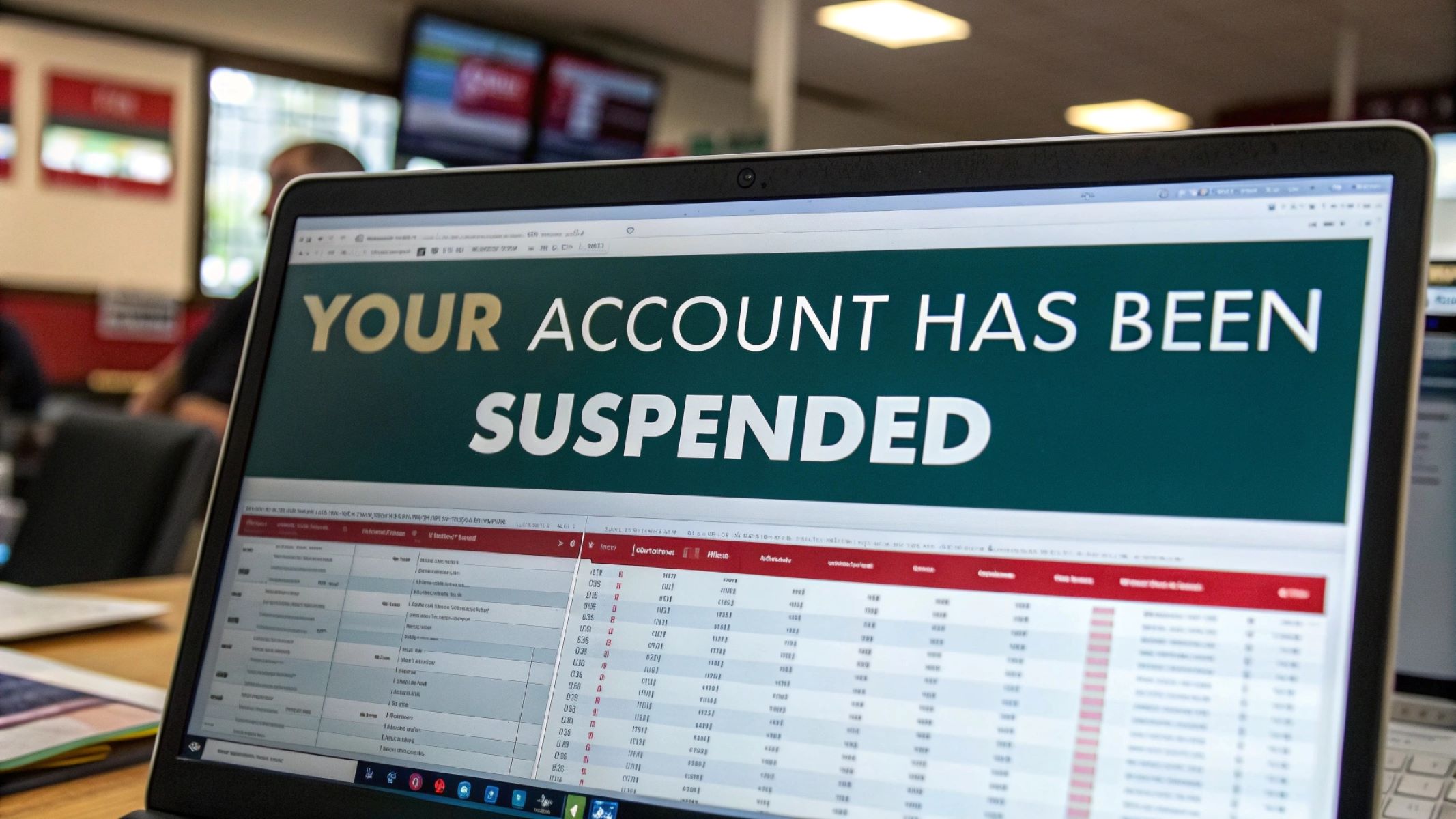Ever logged into your betting account, only to be greeted with a cold, heart-sinking message: “Your account has been suspended”? Yeah, that moment sucks. No prior warning, no hint, just a complete lockout. If you’re betting with South African bookmakers, this isn’t as rare as you might think. But why does it happen, and more importantly, what can you do about it?
The Legal Landscape of Betting in South Africa
Before we dive into the reasons why bookmakers might suspend accounts without warning, it’s important to understand the legal environment that governs betting in South Africa. Betting here isn’t a free-for-all; it’s tightly regulated by a mix of national laws and provincial regulations. This layered approach means that every bookmaker operating in the country has to follow a complex set of rules designed to keep gambling safe, fair, and above board. It’s not just about protecting the business; it’s also about protecting you, the player.
At the national level, the cornerstone of gambling regulation is the National Gambling Act of 2004. This act sets the foundation for legal gambling across the country and establishes frameworks to prevent illegal betting operations. It ensures that only licensed operators can offer betting services and requires them to implement robust systems to prevent fraud and money laundering. But South Africa doesn’t stop at national regulations—each province has its own gambling board and additional rules that bookmakers must follow to operate locally. This means compliance is a multi-layered process and bookmakers must navigate a patchwork of regulations depending on where their customers are based.
Another crucial piece of legislation is the Financial Intelligence Centre Act, commonly known as FICA. This law is primarily aimed at combating money laundering and financial crimes by requiring bookmakers to thoroughly verify their customers’ identities and monitor suspicious financial activities. As a result, bookmakers have to be vigilant about where the money is coming from and going to, which can sometimes lead to accounts being frozen or suspended if something looks out of place. It’s a necessary but sometimes frustrating process, designed to prevent criminals from exploiting betting platforms.
All these laws combined give bookmakers broad authority to freeze or suspend accounts if they suspect any illegal activity or breach of terms. While it may feel harsh or sudden from a player’s perspective, these measures are part of a bigger effort to maintain the integrity of betting in South Africa. So, when your account is suspended without warning, it often reflects these legal obligations bookmakers have to follow—sometimes before they can even get a chance to explain themselves. Understanding this legal landscape can help you see the bigger picture behind those frustrating lockdowns.
Why Do Bookmakers Suspend Accounts Without Warning?
Bookmakers don’t suspend accounts on a whim. There are several serious reasons behind such actions, and while each case is unique, some common factors tend to pop up repeatedly. Understanding these can help you avoid getting caught off guard. Here’s a detailed list explaining the main reasons why bookmakers might suspend your account without giving you any prior notice:
- Security Concerns: Bookmakers prioritize protecting their platforms from fraud and unauthorized access. If they detect suspicious login attempts, unusual device usage, or signs that your account may have been hacked, they may suspend it immediately to prevent further damage. This is a protective move to safeguard both your money and their system.
- Regulatory Compliance: South African bookmakers operate under strict legal frameworks. If your activity raises red flags related to compliance—such as failure to provide proper identity verification documents or suspected involvement in illegal gambling activities—the bookmaker might suspend your account to comply with local laws and regulations.
- Bonus Abuse: Many players try to exploit welcome offers, promotions, or bonuses by creating multiple accounts or engaging in matched betting in ways that violate the terms and conditions. Bookmakers have automated systems designed to catch such abuse, and once flagged, they often suspend accounts immediately to prevent further exploitation.
- Multi-Accounting: Creating more than one account on the same platform is usually against bookmaker rules. This includes using different emails, phone numbers, or even devices to bypass restrictions or claim bonuses multiple times. Detecting multiple accounts linked to the same person or IP address is a common reason for sudden suspension.
- Irregular Betting Behavior: Betting patterns that look abnormal or unnatural can attract attention. This could include consistently placing large bets on unlikely outcomes, rapid-fire bets during live games, or using inside information to win repeatedly. Bookmakers analyze betting behavior closely and may suspend accounts to investigate suspicious activity.
- Use of Automation or Bots: Employing betting bots or automated tools to place bets is considered cheating. Bookmakers actively monitor for such behavior and suspend accounts caught using these tools, as automation can unfairly skew odds and disrupt the fairness of the betting environment.
- Money Laundering Concerns: Bookmakers are legally required to report and act on any suspicious financial transactions. If your deposit and withdrawal patterns appear unusual, or you’re transferring funds in a way that looks like money laundering, your account may be suspended pending investigation.
- Disputes Over Payments or Chargebacks: If you dispute a payment or initiate a chargeback after depositing money, bookmakers often view this as a breach of trust and financial agreement. In response, they may suspend your account and withhold funds while sorting out the issue.
- Violation of Terms and Conditions: Sometimes, account suspensions stem from players unknowingly breaking the rules. This might include sharing accounts with others, using VPNs to mask location, or betting on restricted events. Even accidental breaches can lead to suspension.
Suspicious Betting Patterns
| Suspicious Pattern | Description | Why It’s Flagged | Examples | Potential Consequences |
| Large Bets on Niche Markets | Placing unusually large bets on obscure or low-profile events | These markets usually have less information and are harder to predict | Betting big on U21 women’s handball in Estonia | Account suspension, bet voiding, or limits imposed |
| Late-Minute Bets with High Accuracy | Placing bets just before the event starts or during live play with perfect timing | Could indicate insider information or advanced bots | Betting on exact outcomes seconds before kickoff | Immediate account freeze and investigation |
| Consistent Wins in High-Margin Markets | Regularly winning bets in markets with bigger bookmaker margins | Suggests unfair advantage or syndicate coordination | Winning repeatedly in Asian handicap or live betting | Betting restrictions, bonus cancellation, or ban |
| Frequent Small Cashouts After Wins | Withdrawing small amounts after many small wins | Could be an attempt to avoid detection of larger winnings | Regularly cashing out after minor wins | Suspicious activity warning, account review |
| Unusual Betting Timing and Frequency | Betting in patterns that don’t match typical user behavior | Automated betting or coordinated syndicate activity | Placing many bets in rapid succession during live games | Temporary freeze, manual review of account |
Verification Issues and KYC Failures
Verification is a crucial part of the betting process in South Africa. Bookmakers are legally obligated to confirm the identity of their customers under regulations like the Financial Intelligence Centre Act (FICA). This process, commonly known as KYC (Know Your Customer), is designed to prevent fraud, money laundering, and underage gambling. When you sign up for an account, you’ll likely be asked to provide documents such as a government-issued ID, proof of address, and bank statements. If any of these documents don’t match your personal details or appear suspicious, your account can be immediately frozen or suspended.
One common problem arises when submitted documents are blurry, incomplete, or inconsistent. For example, if the name on your ID doesn’t exactly match the name you used to register your betting account or your bank card, it raises a red flag. Bookmakers have sophisticated software and manual checks that scrutinize every detail, from dates to signatures. Any mismatch can delay account verification or trigger a suspension while the bookmaker investigates further. This is frustrating for players but necessary to ensure compliance with strict regulatory requirements.
Another major red flag is the use of someone else’s bank card or payment details. Bookmakers want to make sure the money you deposit and withdraw belongs to you. Using third-party cards or accounts not only violates their terms but also increases the risk of fraud and financial crime. This often leads to immediate suspension and requires submitting additional proof to clear up the situation. Similarly, refusing or delaying the upload of proof of address, such as utility bills or bank statements, can stall verification and prompt account holds. These documents help bookmakers confirm your residency and protect against identity theft or account misuse.
The best advice for bettors is to be upfront and consistent with your personal details. Always ensure that the name on your betting account matches exactly with your official ID and banking information. Double-check your documents before uploading to avoid common mistakes like blurriness or incomplete information. When you comply with verification requests promptly and transparently, it reduces the chances of your account being frozen and helps maintain a smooth betting experience. Remember, KYC isn’t just red tape—it’s a critical safeguard to protect you and the betting industry.
Bonus Abuse and Promotional Exploits
Bonuses and promotions are a major draw for bettors, especially welcome offers and free bets. But while they can boost your bankroll, bookmakers are very strict about how these incentives are used. Bonus abuse happens when players try to exploit offers in ways that violate the terms and conditions, essentially tricking the bookmaker into giving away free money unfairly. This behavior damages the integrity of the betting platform and leads to quick account suspensions. Here’s a detailed list of common bonus abuse and promotional exploits that bookmakers actively hunt for:
- Opening multiple accounts with the same bookmaker to claim welcome bonuses more than once
- Using fake or false personal details to create extra accounts for bonus hunting
- Registering accounts with friends’ or relatives’ IDs to bypass single-account rules
- Exploiting bonus loopholes by placing minimal-risk or no-risk bets designed solely to unlock free bets or bonuses
- Matched betting across different bookmakers or platforms to guarantee profits from bonus offers
- Rapidly withdrawing deposits before meeting wagering requirements while still claiming the bonus
- Sharing bonus codes or account details with others to multiply promotional gains
- Manipulating bet outcomes through collusion or insider info during bonus periods
- Using VPNs or proxy servers to disguise location and access region-restricted bonuses
- Taking advantage of reload bonuses by cycling deposits and withdrawals repeatedly
- Engaging in bonus arbitrage — placing bets on opposite outcomes across different sites to guarantee a win from bonuses
- Creating accounts during a promotion and abandoning them after claiming the bonus, often leaving funds unused
- Failing to meet wagering or playthrough requirements but attempting to withdraw bonus-related winnings
- Exploiting technical glitches or errors in bonus terms before bookmakers patch them
- Using bots or automation to systematically claim bonuses and place qualifying bets quickly
Multiple Accounts Under One Name or IP
| Detection Method | What It Tracks | Suspicious Behavior Examples | Risk Level | Typical Consequences |
| IP Address Monitoring | Tracks the internet address used to access the site | Multiple accounts logging in from the same home or office IP | High | Instant account suspension or ban |
| Device Fingerprinting | Identifies unique device IDs, including phones, tablets, and computers | Several accounts accessed from the same smartphone or laptop | High | Accounts linked and frozen pending review |
| Browser Cookies | Stores user data and preferences; detects repeated visits from same browser | Using different emails but same browser cookies for login | Medium to High | Temporary freeze and verification requests |
| Email and Phone Number Analysis | Checks if multiple accounts use similar or related contact info | Multiple accounts registered with similar email domains or phone numbers | Medium | Account closure and loss of bonuses or funds |
| Behavioral Pattern Analysis | Looks for similar betting patterns or login times across accounts | Accounts placing similar bets or logging in at identical times | Medium to High | Investigation and potential permanent ban |
Use of Betting Bots and Automation Tools
Using betting bots or automation tools to place bets might sound like a smart shortcut, but in the world of South African bookmakers, it’s a big no-no. Unlike some financial markets where algorithmic trading is common and accepted, the betting industry sees automation as a form of cheating. These bots can place bets faster and more precisely than any human, giving users an unfair advantage over others and disrupting the natural flow of betting markets. As a result, bookmakers have strict policies banning the use of such tools.
Bookmakers actively monitor betting activity for signs of automation. They analyze the speed, timing, and patterns of bets, and if they detect unusually consistent or lightning-fast wager placements that no human could realistically achieve, it triggers an immediate investigation. The use of bots is particularly scrutinized in live betting and betting exchanges, where quick decisions and odds movements are frequent, making automated systems even more powerful and potentially damaging to the bookmaker’s balance.
If you’re caught using bots or scripts to automate your bets, the consequences are severe. Bookmakers often suspend accounts on the spot, void any winnings made while using automation tools, and may even confiscate your deposited funds. Beyond that, being flagged for bot usage can lead to blacklisting, meaning your details could be shared among partner sites and other bookmakers, making it nearly impossible for you to open new accounts elsewhere. The betting industry maintains a united front against automation to keep the playing field fair for everyone.
Ultimately, while automation tools might seem like a tempting way to “beat the system,” they come with enormous risks that far outweigh any potential benefits. The betting environment thrives on fairness and unpredictability, and using bots undermines both. For serious bettors, the best strategy is to focus on learning the games, developing skillful approaches, and playing responsibly—because there’s no shortcut to consistent success.




